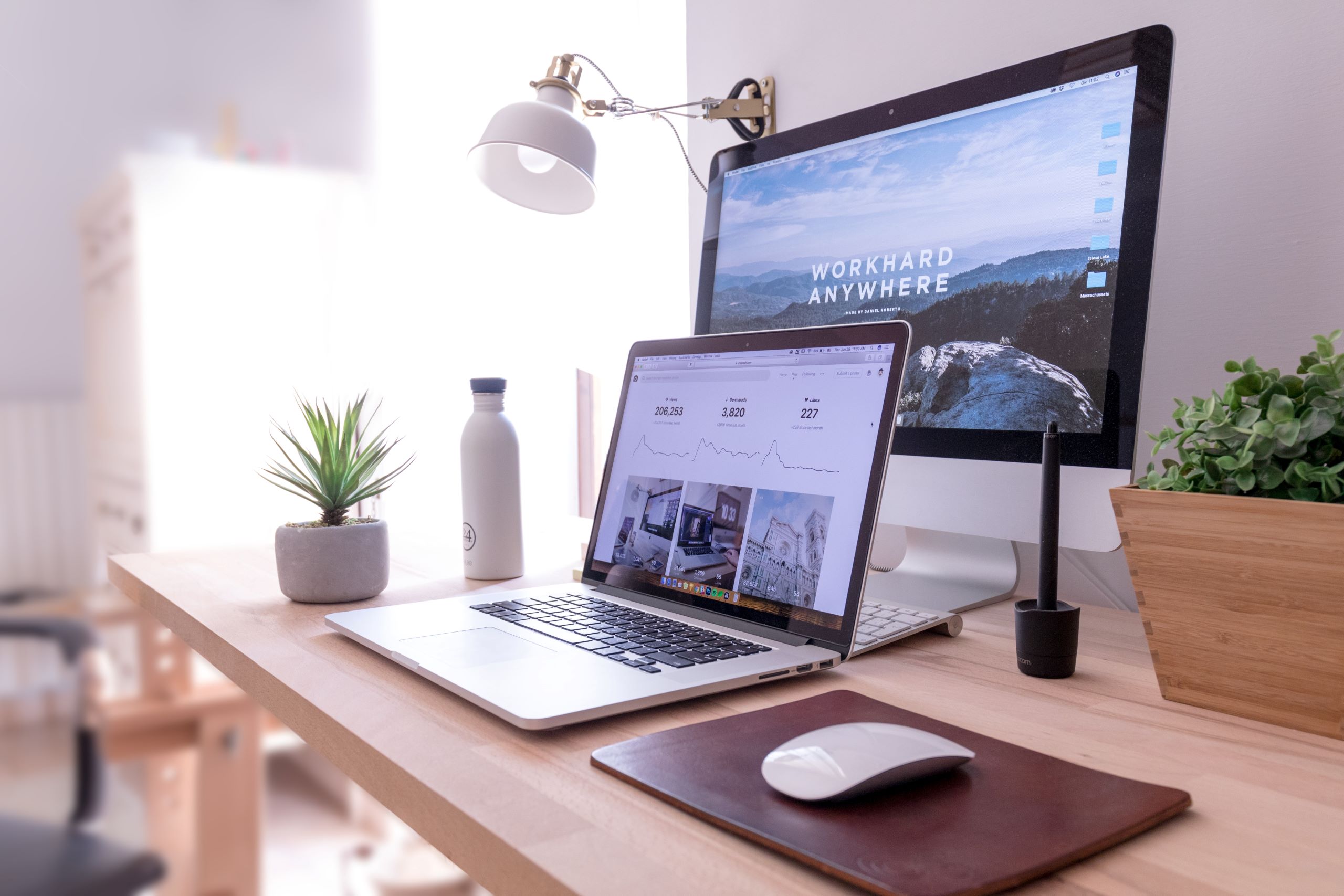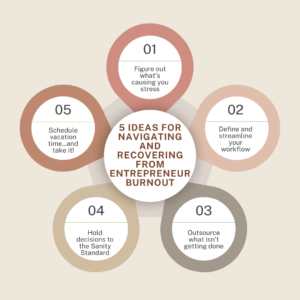It’s ironic, isn’t it? Many of us quit the 9 to 5 and start our own business so that we can do what we’re passionate about, spend more time with loved ones or pursuing hobbies, and have a better work-life balance. And then? We end up pushing ourselves way harder than our boss ever did.
No matter where you are in your journey as a small business owner—just starting out or feeling like you’re burning out—it’s SO important to prioritize your mental health. As a small business owner who has dealt with depression and anxiety since childhood, and who’s also experienced the normal ups and downs of starting and running a sole proprietorship, here are a few mental health tips for small business owners that have helped me. I hope you’ll find some useful ideas you can incorporate into your own business routine!
Minimize What You Have to Do
One of the first things to recognize is that being a business owner really can be overwhelming. It’s not just feelings—it’s the reality of the situation. Rather than get discouraged by that, I’ve found it helpful to focus on what’s really important to me and minimize my to-do list.
Identify why you started your company, what your goals are, and what parts of running your business bring you the most satisfaction. Are there things you can eliminate or intentionally put on the back burner? Things that need to get done that you don’t love and could potentially outsource?

For example, I hate social media. We’re talking passionately hate social media. But it’s so ubiquitous that I feel like my business should be on there. And at the moment, I’m not ready to outsource. After some consideration (and talking with my business buddy—more on that below) I decided to give it a try—but on my terms. I realized that I’m never going to post to social media multiple times a day, like I’m supposed to. And that’s okay. Because I’m a sole proprietorship, I’m not looking to expand my business hugely or rapidly, so I don’t really use social media as a marketing tool. Instead, I hop on social media just once a week. I reply to any comments I’ve received and post a little something. Mostly, I use social media to connect with current and potential clients and provide information they might find useful. So yes, I do social media, but I’ve created boundaries so that Instagram and Facebook serve my purposes rather than become my taskmasters.
Make Your Office Space a Happy Place
You know one of the things I hated most about my previous jobs? I never had a dedicated office space. At best, I had a desk that someone else used on my days off, and in some jobs there was just a station of computers that the whole office shared. But either way, I could never personalize my workspace.
Working from home though, you and I have the opportunity to create a good-vibes kind of work area. While it’s certainly possible to get your work done at the dining room table, surrounded by the breakfast dishes you’re going to get to later and piles of mail you really need to sort, most of us benefit from a dedicated space in which to work. And if you’re going to be spending a lot of time there, why not make it pleasant? Maybe you want to decorate with candles, houseplants, photos, inspirational quotes, and matching desk accessories. Or maybe a clear space with absolutely nothing but your computer allows you to focus better. However you do it, it can feel empowering to carve out a place that’s dedicated to the business you’ve created.
By the way, when I talk about a dedicated office space, I’m not necessarily talking about a whole room you can use as an office. Not everyone has that luxury. If you’re wondering about my own workspace….Confession: It’s just a desk. It doesn’t have a dedicated room of its own, it’s simply tucked into the available space that I have. But work is the only thing I do at it, which means that when I sit down, I’m in the right frame of mind to get things done—and yes, there are candles and houseplants.

Practice Saying No
This was one of the toughest lessons for me to learn. Saying no is something a lot of people struggle with, and it can be even harder when you’re new to owning a business. You want to take advantage of every opportunity, and if you’re pressed for money, the last thing you want to do is turn down a potential client. I’ve been there—and I’ve learned that it’s way better to turn down someone you know is going to be a hassle, rather than stress yourself out bending over backwards to give them what they want—when really, maybe your business isn’t the best fit for them.
Setting barriers also falls into the category of saying no. Whether that’s setting expectations for yourself (like not checking your email once you’re done with work for the day) or expectations for others (like the types of services you do and don’t offer), setting clear boundaries is a crucial component of looking out for your mental health as a small business owner.
Don’t Work Overtime
Working long hours and not giving yourself necessary breaks is one of the biggest reasons for burnout among small business owners. And sometimes it can be exacerbated by working from home. Different methods work for different people here, but basically, it’s important to set regular hours AND to give yourself breaks, days off, and vacations.
Don’t feel obligated to stick to a traditional 9 to 5, M-F schedule for this, by the way. Figure out what works best for you. For example, I do a four-day workweek. I give myself the weekends, and I also give myself a day off mid-week. I find that this schedule provides a good balance and prevents me from going into the end of the week exhausted, or from dreading the beginning of the next week. After all, I never have to work more than two days before I get a break.

Remember, taking time off isn’t neglecting your business. It’s making sure you come at each workday fresh, creative, and feeling your best.
Take Care of Yourself Physically
We all know how important it is to get enough sleep, exercise regularly, stay hydrated, and eat right. And yet, when business and life start to feel overwhelming, basic self-care is one of the first things that gets relegated to the bottom of the to-do list. Why is that, when taking care of ourselves is one of the best things we can do to deal better with day-to-day stressors?
Speaking for myself, I think it’s because I get too ambitious with my physical health goals. I find that I’m able to take better care of myself physically when I set small goals. Like: Have a glass of water at my desk all the time. Do something screen-free and relaxing in the evenings (for me, that’s usually reading) to set myself up for a good night’s sleep. Go for a walk before dinner—doesn’t matter how far I go, but I always feel better when I stretch my legs and get some fresh air. Little goals like this feel manageable, and I find that I can take better care of my body that way than if I set big goals that could discourage me and end up backfiring.
However you do it, make it a priority to take care of your body, because that’s one of the best ways to nurture the well-being of both yourself and your business.
Bookend Your Business Day
I don’t know about you, but I love routine. While owning my own business allows for a lot of flexibility (which I do take advantage of sometimes), I find that I’m happier and more productive when I have a clear beginning and end to my workday.
When you work in an office, the workday rituals are more or less set up for you—and they’re not always a lot of fun. Commuting to work, clocking in, or checking messages from the night before signal a clear start to your day job, but they may not make you excited about it. Working for yourself, you have more power to set yourself up for success each day with a ritual that feels good.
I like to start my workday off with a prayer and some verses of scripture. This puts me in a frame of mind to be grateful for the opportunity to run my own business, while keeping my work in perspective. When I knock off for the day, I take a few minutes to do something I enjoy—reading a chapter of my book, playing with my pets, or taking a quick walk. Bookending my business day with a nice, simple ritual gives it a clear beginning and end—and makes it easier to maintain a healthy work-life balance.

Lastly, Don’t Go It Alone
Running a business, especially a sole proprietorship, can feel pretty lonely sometimes. And kinda scary. But it can be less so if you have a business buddy—someone to bounce ideas off of, be accountable to, and share challenges and successes with. A business buddy doesn’t have to be in the same industry as you. They don’t even necessarily have to be a small business owner themselves, although it helps.
I’ve found that short weekly “huddles” with my brother (a videographer who specializes in creating content for real estate agents) are hugely helpful in keeping me on track. Together, we each set goals for the upcoming week and review how we did last week. Depending on the week, we might also share something we learned, brainstorm solutions to challenges one of us is facing, congratulate each other on a recent success, or ask for feedback on a new idea. The point is, we’re taking ourselves out of the little bubble that can form around owners of sole proprietorships who work from home, and making sure neither of us is alone in the big bad world of trying to a run a business.
It’s true that being a small business owner can be a lot tougher than you envisioned it when you decided to quit your day job. But it can also be the best decision you ever made—as long you make it part of your job to be kind to yourself and take responsibility for your happiness and well-being. I hope these mental health tips for small business owners have been helpful and that you’ve found some inspiration for changes you can make in the day-to-day of your life as an entrepreneur. I’d love to hear about your experiences incorporating these ideas, or other self-care tips you’ve had success with as a small business owner. Feel free to share in the comments!


